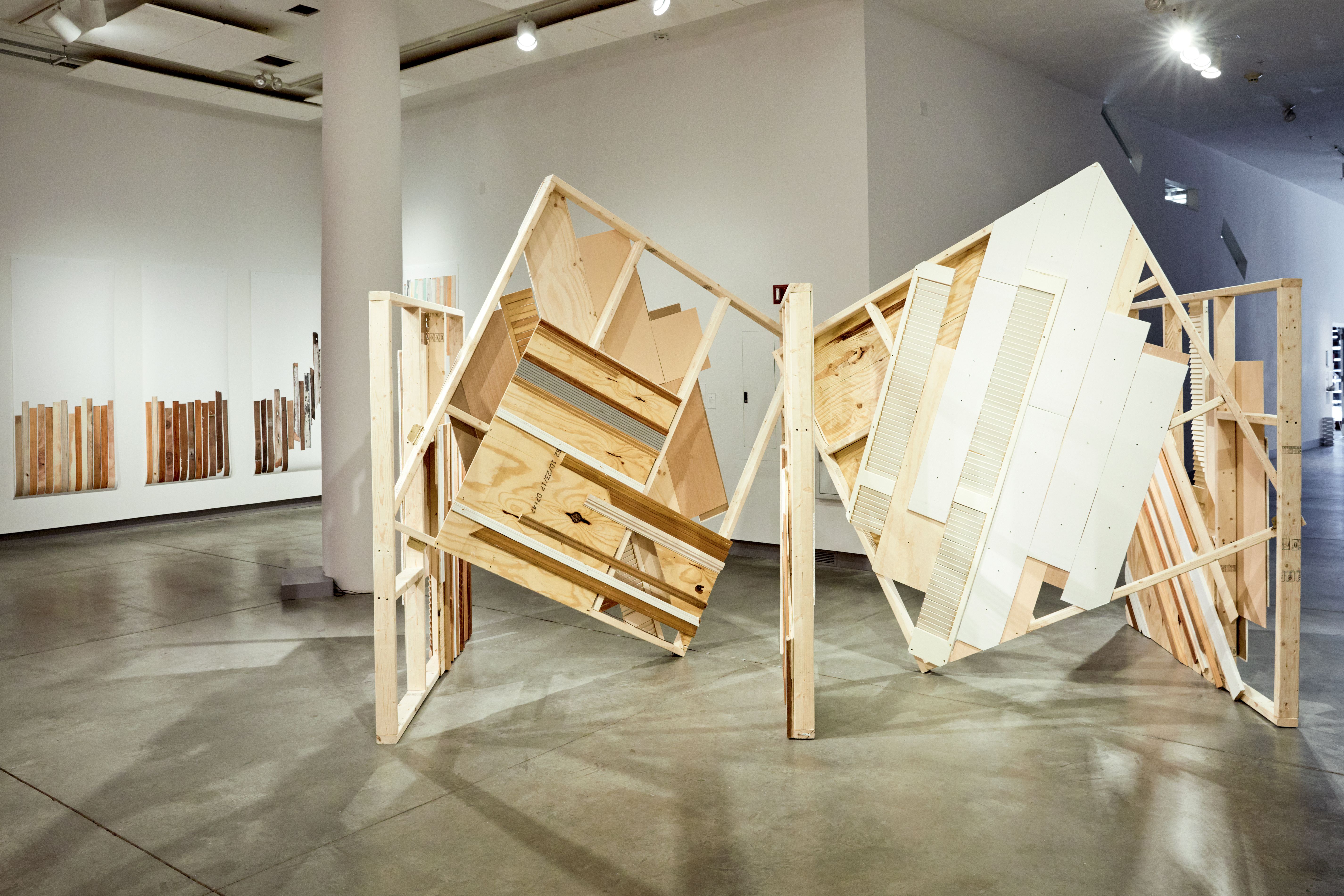Areas of Study
Master of Fine Arts (MFA)
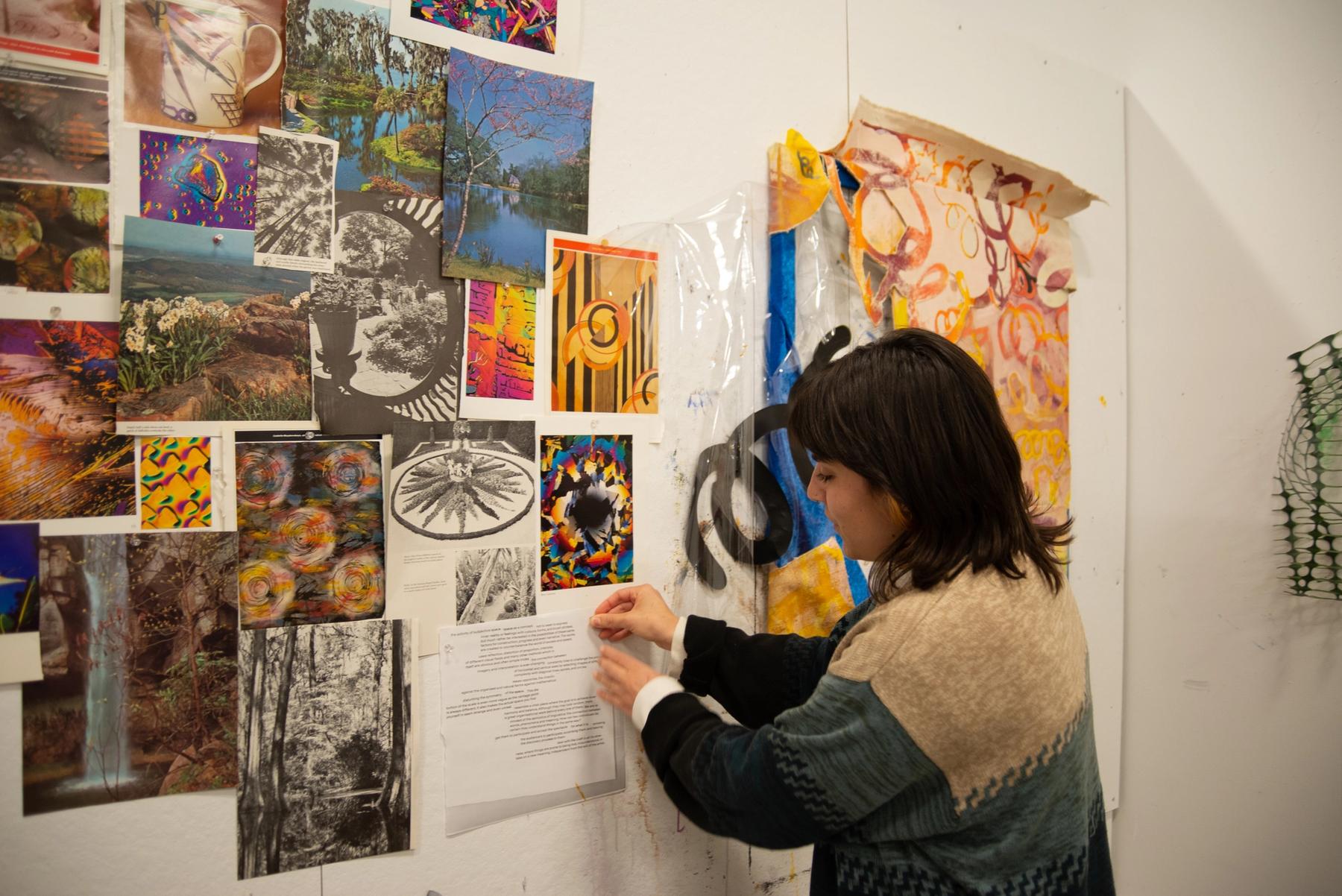
Maine College of Art & Design offers a Master of Fine Arts in Studio Art (MFA) program with a studio-based curriculum to create a transformative learning experience.
Through individualized research, critical analysis, and curatorial experimentation, graduate students develop a sustainable vision for their art practice. The program provides both low-residency and full-residency options, allowing students to choose between a flexible, remote format or immersive, on-campus instruction. MFA candidates work closely with renowned faculty, visiting artists, and graduate advisors, and have 24/7 access to studio facilities to support their creative process.
Learn More

Jonathan Spath MFA '26, Untitled, digital capture, inkjet print, 14"x21", 2024
Interdisciplinary research, self-directed studio practice, national and international travel
The Master of Fine Arts in Studio Art (MFA) program at Maine College of Art & Design (MECA&D) offers an interdisciplinary approach that encourages students to think across traditional academic boundaries, expand their art practice, and challenge their intellectual curiosity.
Our six-term curriculum emphasizes the intersection of studio practice, individual research, and critical analysis. Built on a commitment to one-on-one student mentoring by distinguished faculty, Visiting Artists, critics, and curators, MECA&D’s MFA program offers a dynamic and supportive learning environment for artists who want to define and pursue a sustainable and attainable vision for their art practice.
Apply
We welcome students to apply by the priority application deadlines stated for each program. Each applicant is considered for merit-based scholarships upon acceptance into the college.
Two-Year MFA Curriculum Outline
Year One
Your first year is designed to help you explore new techniques and research ideas. This provides a framework for developing vocabularies and broadening resources to support your work.
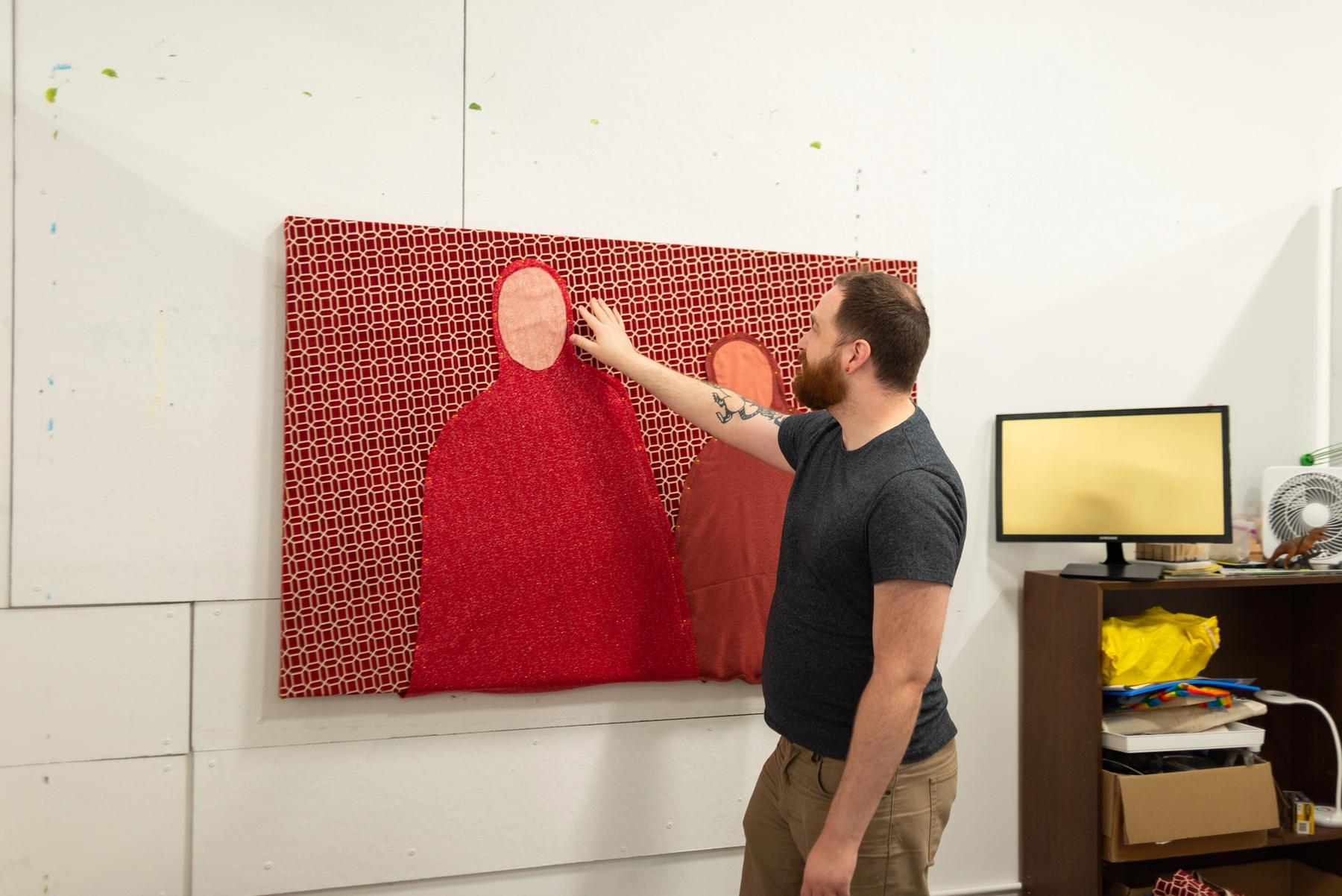
Summer Intensive: Context
(8 weeks)
The Summer Intensive runs in Portland, from mid-June to early August. All Low and Full Residency students attend.
The academic year starts in June with an on-campus Summer Intensive focused on creation, critique, and experimentation with weekly feedback from peers, faculty, and Visiting Artists. Experience two hour-long group critiques, attend lectures, and participate in Visiting Artist interviews as well as peer critiques. Full and Low Residency students reside in Portland for this term.
- Studio I
- Studio Seminar I
- Studio in Context: Applied Theory and History
Fall Term: Expansion
(15 weeks)
Low Residency students work from their home studio, and Full Residency students work on campus in Portland.
During the Fall term, your pace of study will slow down from summer to let you become deeply immersed in making, thinking, and critiquing around your studio practices. Full Residency students have the opportunity to work as Teaching Assistants during the Fall term.
- Studio II
- Studio Seminar: Research Methodologies (online)
- Studio in Context: Views on Contemporary Art (online)
+ Winter Intensive, December (online, full cohort)
+Permission to proceed to Spring Term from MFA Chair
Spring Term: Expansion
(15 weeks)
Low Residency students work from their home studio, and Full Residency students work on campus in Portland.
The Spring term continues your studio practice immersion, with continued engagement and support around your art. Full Residency first-year students have the opportunity to work as Teaching Assistants during the Spring term.
- Studio III
- Studio Seminar: Studio Writing (online)
- Studio in Context: Approaches to Critical Theory (online)
+ Winter Intensive: December and January Presentations (online, full cohort)
+ March NYC Studio Research Trip (full 1st Year cohort)
+ Permission to proceed to 2nd Year from MFA Chair
Year Two
Bring together ideas and influences across your practice. Through studio visits and presentations, you'll create and refine language that reflects what is important to your work and your viewers.

Summer Intensive: Convergence
(8 weeks)
The Summer Intensive runs in Portland, from mid-June to early August. All Low and Full Residency students attend.
- Studio IV
- Studio Seminar IV
- Studio in Context: Critical Writing
Fall Term: Convergence
(15 weeks)
Low Residency students work from their home studio, and Full Residency students work on campus in Portland.
- Studio V
- Studio Seminar: Professional Practices (online)
- Studio in Context: Thesis Proposal (online)
+ International Studio Research Trip (full 2nd Year cohort)
+ Winter Intensive, December (online, full 2nd Year cohort)
Spring Term: Synthesis
(15 weeks)
Low Residency students work from their home studio, and Full Residency students work on campus in Portland.
- Studio VI
- Studio Seminar: Thesis Exhibition (online)
- Studio in Context: Thesis Composition (online)
+ May Intensive (on campus, full 2nd Year cohort)
+ Permission to graduate from the MFA Chair
MFA Program Outcomes
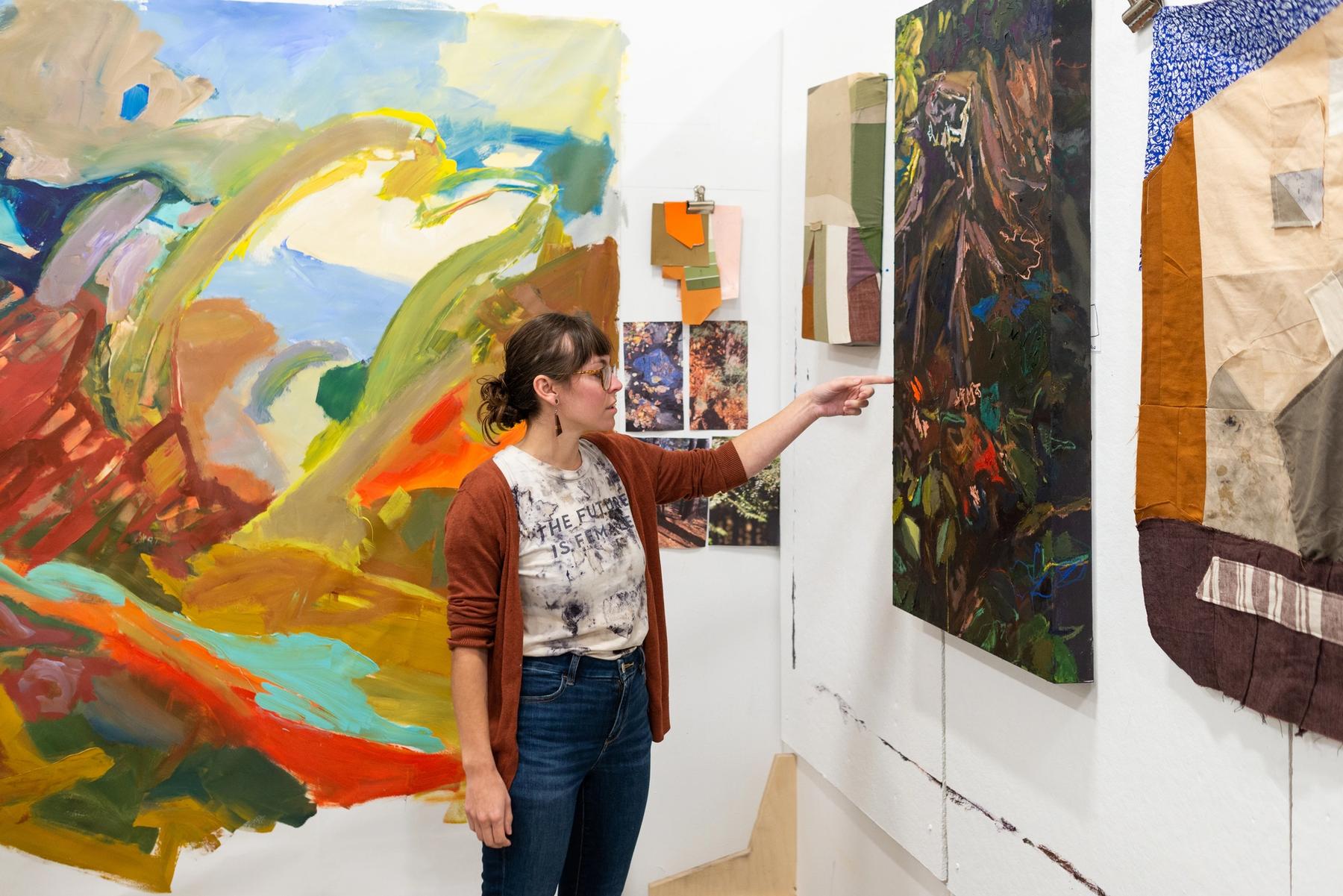
Successful MFA students...
- Have developed a mature body of work based on focused scholarship and studio production.
- Have established sustainable working methodologies to support continued practice.
- Possess extensive knowledge of contemporary art practice and discourse.
- Understand the location of one’s work within a historical, social, economic, intellectual, material, and aesthetic context.
- Understand methods of potential dissemination, considering both conceptual and professional contexts.
Master of Fine Arts (MFA) Program FAQ
How long does it take to complete the MFA program?
The MFA in Studio Art at Maine College of Art & Design is structured as a two-year, six-term program. All students, regardless of residency path, complete the same curriculum over this period, which includes summer intensives, academic-year seminars, independent research, and a culminating thesis exhibition.
Do I need to work in a specific medium to apply?
No. The MFA program welcomes artists working in all media, including interdisciplinary and experimental forms. Whether your practice involves painting, performance, digital work, or a mix of approaches, the program is designed to support your unique vision and evolution.
Is the MFA program cohort-based?
Yes. While each student’s path is highly individualized, you’ll be part of a cohort that shares critiques, seminars, and travel experiences. This peer group provides a built-in network of dialogue and support, helping to challenge, refine, and expand your ideas over time.
What is the difference between Low Residency and Full Residency?
Low Residency students work from their home studios during the academic year and return to campus for Summer and Winter Intensives. Full Residency students live and work in Portland year-round with full access to Maine College of Art & Design’s facilities. Both options follow the same curriculum and receive equal access to faculty, critiques, and mentorship.
What are the job opportunities after an MFA?
MFA graduates pursue a wide range of careers in the arts and education. Many go on to exhibit their work professionally, teach at the college or university level, lead arts organizations, or work as curators, writers, or community-based artists. Others launch artist-run spaces, write books, or build interdisciplinary practices that combine art with research, activism, or entrepreneurship.
MFA Graduate Faculty
Julie Poitras Santos, Program Chair of MFA in Studio Art, Associate Professor of MFA in Studio Art
Stephen Benenson, Adjunct Assistant Professor of MFA in Studio Art and Foundation
Sebastian Black, Adjunct Assistant Professor of MFA in Studio Art
Jeane Cohen, Adjunct Assistant Professor of MFA in Studio Art
Lourdes Correa-Carlo, Adjunct Assistant Professor of MFA in Studio Art
Brian Droitcar, Adjunct Assistant Professor of MFA in Studio Art
Annika Early, Adjunct Assistant Professor of MFA in Studio Art
Lauren Fensterstock, Assistant Professor of MFA in Studio Art
Alison Ferris, Adjunct Instructor of MFA in Studio Art
Sophie Hamacher, Assistant Professor of MFA & Academic Studies
Adriane Herman, Professor of the MFA in Studio Art & Printmaking
Rachel Katz, Adjunct Instructor of MFA in Studio Art, Administrative Director of Graduate Programs
Marla McLeod, Adjunct Assistant Professor of MFA in Studio Art
Seth Rogoff, Visiting Assistant Professor of MFA in Studio Art
Christopher Stiegler, Assistant Professor of MFA in Studio Art
Ling-Wen Tsai, Professor of Sculpture and Foundations and MFA in Studio Art
Choosing Low or Full Residency
Crucial to your success as an artist is the ability to determine where to set up your studio. That is why we offer both Low or Full Residency options to our MFA candidates during our Fall and Spring terms.
Among the first programs of its kind in the United States, our Low Residency option combines intense periods of on-campus instruction with the freedom and independence of working from any home location, anywhere in the world. Full Residency means that you take classes in person with your peers and have access to all the available facilities at the College.
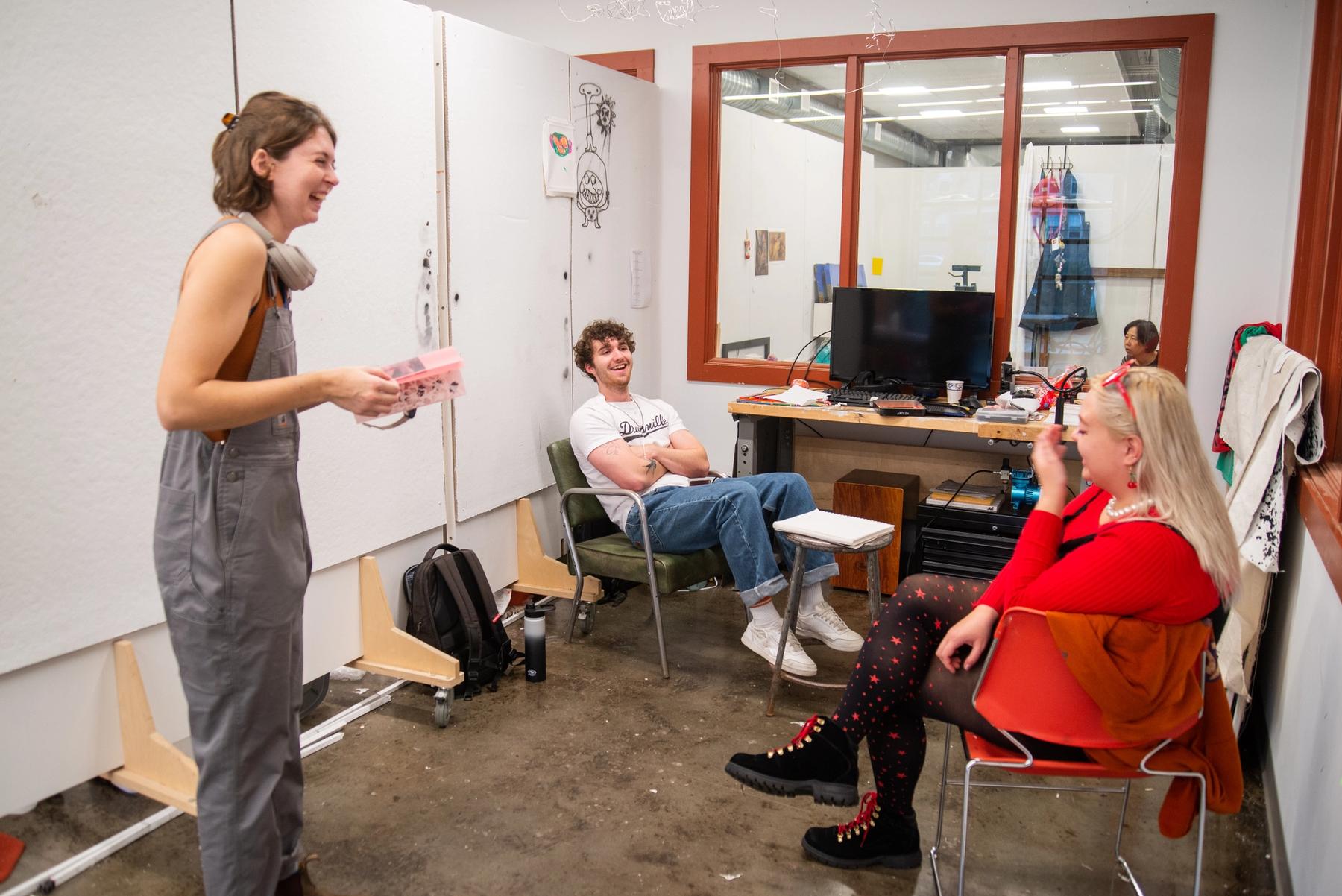
Reasons to Choose Low Residency
- On campus for Summer Intensive, additional intensives, and research field trips
- 24/7 access to campus and your own studio space during Summer Intensive
- Fall and Spring terms from your personal home studio
- One-on-one studio mentorship with a carefully selected Non-Resident Studio Advisor (NRSA)
- Research and studio seminars are held online and asynchronously during the Fall and Spring terms to maintain an ongoing connection with your Full Residency peers
- Structure promotes flexibility and independence
Whether you opt for the Low or Full Residency path, you'll have access to the same classes and group and individual work opportunities.
If your needs change from one year to the next, you may choose to switch between Low and Full Residency at that time. We collaborate with you to determine and arrange what best supports your creative work and future aspirations.
Reasons to Choose Full Residency
- On campus for Summer Intensive, Fall term, and Spring terms
- 24/7 access to 200,000 square feet of state-of-the-art facilities
- 24/7 access to your studio space
- One-on-one studio mentorship
- Access to regional opportunities
- Research and studio seminars are held online and asynchronously during the Fall and Spring terms to maintain an ongoing connection with your Low Residency peers
- Teaching assistantship during Fall and Spring terms (3 terms)
- Structure promotes collaboration and cross-pollination
*You may choose to live in Portland and still pursue the Low Residency option.
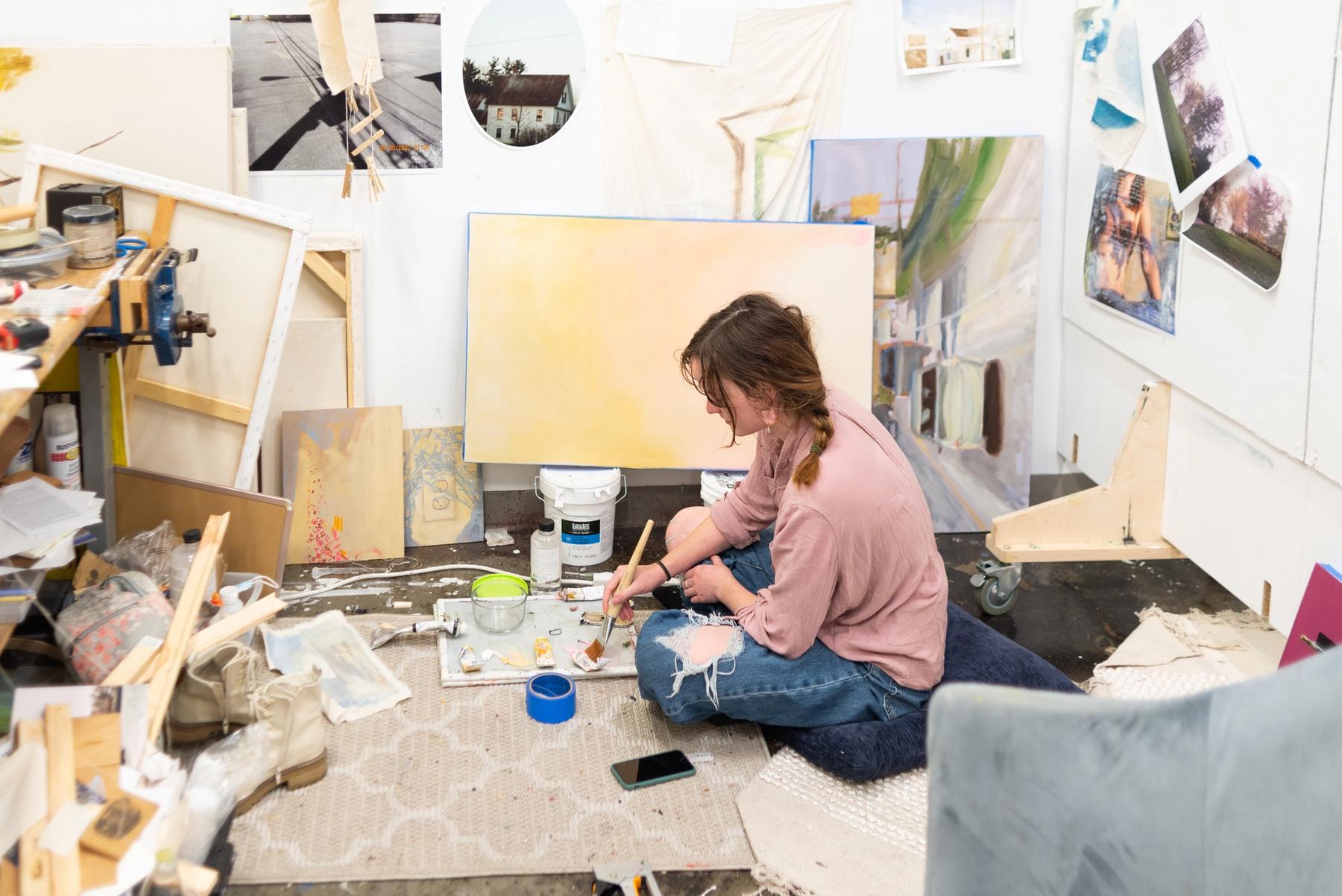
Master of Fine Arts (MFA) Program Description
Where might your art take you?
Whether you want to exhibit and lecture about your work, teach, write a book, create an artist-run collective, or something completely different, Maine College of Art & Design’s Master of Fine Arts in Studio Art (MFA) program is designed to encourage and support your path as you follow your work where it needs to go.
We offer a studio-based curriculum that creates a transformative learning experience for students. Graduate students in the MFA program define a sustainable vision for their own art practice through individualized research, critical analysis, and curatorial experimentation.
Working alongside renowned local, national, and international faculty, visiting artists, and carefully selected graduate advisors, MFA candidates engage in a six-term curriculum that emphasizes the intersection of studio practice, individual research, and critical analysis.
Embedded into the MFA program is a level of flexibility—including both Low and Full Residency options, 24/7 access to our studio facilities, and graduate advisors wherever you choose to set up your studio practice; all of which allows us to tailor our support to your needs as they develop and change throughout your time here.
MFA Thesis & Exhibition
Upon completion of the Master of Fine Arts (MFA) program, you will be prepared to pursue future artistic endeavors and contribute to cultural dialogue.
A copy of your thesis project will live on in the Joanne Waxman Library for future artists and designers to explore, learn from, and refer to.
Along with your written thesis, prior to Commencement, you will install an exhibition of your studio thesis project that will remain on view at the Institute of Contemporary Art and virtually.
MFA Thesis Exhibitions typically feature work in a variety of media, including drawing, video, performance, sculpture, painting, printmaking, virtual reality, fiber, photography, and installation.
Seen together, the thesis projects hybridize a range of conceptual themes and material approaches as they relate to visual culture, the political landscape, and contemporary art practice.

Travel with Your Cohort
One of the biggest myths about making art is the solo, artistic genius. But no artist acts entirely alone. The best work comes from research and dialogue. Artists benefit from collaborating with others and collectively working to elevate the field of art.
To encourage this exposure to and engagement with the broader global community of contemporary artists, each MFA cohort has an opportunity to travel together to visit exhibitions and participate in self-guided research.
Past cohorts have traveled to:
Venice, Italy; Berlin, Germany; London, UK; Montreal, Canada; Philadelphia, PA; San Francisco, CA; New York City, NY; Boston, MA
